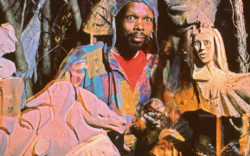It’s been close to five years since singer-songwriter Green Gerry left Athens to return to his native California. Gerry has kept busy since then, following up his 2013 sophomore record, King Baby, with a string of singles released over the summer on L.A.-based label Hit City U.S.A. A combination of frustration with the music industry and despair over current events led him to release his third effort, Electric Iron, on his own, with all proceeds going to charity.
Flagpole caught up with Green Gerry to talk about the newest record, industry woes, and plans for the future.
Flagpole: You’ve said were shopping Electric Iron around to labels for a year, but there were no takers so you decided to put it out on your own, is that right?
Green Gerry: Yeah, I mean it had been something that I was [considering]. It’s really frustrating to just sit on something like that. It feels stunting, like you can’t move forward. We had bites and interest from people, and even prior to this past year of shopping we had been meeting up with labels, and talking to people, and crunching numbers and realities, and it just kinda got old. It was a lot of empty promises, and people being like, “Put me on the list to your show, and then we’ll talk,” and they just never show up. So I kinda got over that.
I got to the point, in light of all the crazy fucking world happenings, to just say, “Let’s just put this out there, let’s do it for free, and if we can donate any money that we make let’s just do that.” I’m not making the same mistake for this next record. I’m just gonna keep moving and putting things out. That’s what I’m good at, you know?
FP: Tell me about the video for “Naive Jukebox & the Dead Deal.” It’s a really striking concept, using only text for the visuals.
GG: Another bout of frustration. I was in talks with a couple different artists about album artwork, and I kept getting these weird hangups. So I was watching “Seinfeld,” the episode where George and Jerry meet to discuss the pilot at NBC and George is adamant about saying it’s a show about nothing―“Nothing!” It kind of made me think, like, music videos are so fucking stupid. I mean, sure, there are some artists who work with great people, but I mean the vast majority of it, and not just the small indie world, is really ridiculous.
So, I thought it would be great to completely remove the physical aspect or the cool aspect or visual aspect of the music video and just fill it with text, a video that’s so dumb it literally says everything that’s happening as or before it happens―like removes the whole concept.
FP: It’s been interesting getting the slow roll of press material coming out around the album―you do have a publicist, we should mention―interesting because you’ll say, essentially, “I don’t know how to market a record.” It seems to me though that you are savvy about the process, but even still, there’s the sense that no matter how savvy you are, it’s still luck of the draw.
GG: Yeah, it really absolutely is, and in a sense it’s true, that is a marketing point: “Oh, I don’t know how to [promote the record], so maybe this is a way, and you’ll look at it.” I mean, you gotta convince someone to look at something and dive in, and now it’s really harder, it’s really difficult to do. But I hoped that it would be good if I was just more up front and honest and like, “I don’t know how to market a record, here’s this weird picture of me, this is good”―maybe that’d work. I don’t know. I’m trying.
FP: Talk about the process of making the record―a song like “Rivals Kiss with an Absolute,” for example.
GG: Um, that one was done quickly. My mom had called me about some money issues, and I got really mad and angered by it. I was just kind of like, “What the fuck, it’s my mom, and she’s living like me.” The whole process of this record was based on voice memos, literally just voice memo after voice memo―[the songs] all started that way, more or less, just from an acoustic guitar idea.
That one in particular, it’s got an old breakbeat Motown sample as the backbeat―the record itself was pretty sample-based in terms of percussion―but then I just started with the bass line and worked my way up, and lyrically I did that one fast ‘ cause I was a little upset, so I sat and wrote everything out and focused on my mom’s issue and tried to direct that anger into the song.
FP: I noticed you had some sound effects at the end there, some gunshots and, I think, maybe a laser at some point?
GG: No, it’s gunshots and a ricochet. That song was more or less done, and I was listening to some Joe Meek recordings, and there were some kind of sound effects, and I was just like, “I should probably do something like that, it’s cool.” People don’t really do that anymore, take that very physical or almost cinematic, ridiculous, cartoony thing and put into a song. And I felt like that was a good way to break the seriousness of that song.
FP: Are you doing any touring around the record?
GG: We’re planning on doing something small, up the [West] Coast. I feel like I kind of missed the boat on doing those old-school tours, like a band like Muuy Biien or whoever. I don’t know. I’m weird, I don’t sleep well most times, and it doesn’t sound incredibly appealing to go around the country. I don’t think I could do it. But I am going to work at it, and we’re going to start doing stuff up north, going as far as Seattle.
I mean, if opportunity rears its ugly head, then maybe we’ll take it―but for now, something that we can contain and grasp is just going up there. Maybe we missed the boat, age-wise, on sleeplessly driving and taking risks. But something small will happen up in the northern area, and if it gets better, maybe we’ll do more. It just depends on how many people read this and listen to this album.
Like what you just read? Support Flagpole by making a donation today. Every dollar you give helps fund our ongoing mission to provide Athens with quality, independent journalism.










